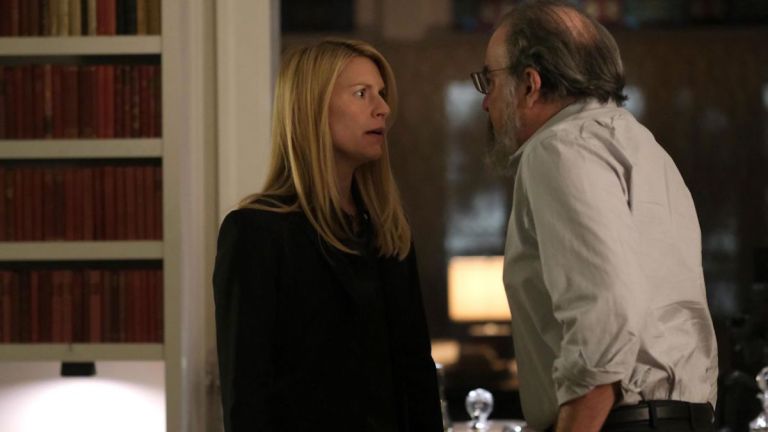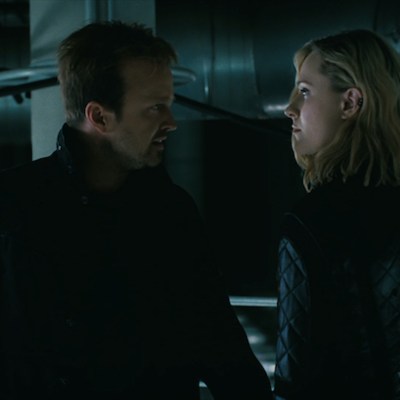Homeland Series Finale Review: Prisoners of War
The Homeland series finale brings Carrie Mathison full circle with the plight of Nicholas Brody for a bittersweet conclusion.

This Homeland review contains major spoilers.
Homeland Season 8 Episode 12
It’s a telling choice that the seeming climax of Homeland, the definitive espionage story of the last decade, ends not with explosions or gunfire, but with the harmonies of a requiem mass. For that is the music Saul Berenson has playing when Carrie Mathison, the daughter he wishes he had, returns home. By this point in the Homeland series finale, what he must’ve suspected last week is inescapable: Yevgeny Gromav has asked a price so steep that Carrie chose not to share it… all the while she also chose not to visit her daughter while back in the States.
So the scene where all the fractures and faults in their relationship comes to bear while Mozart’s “Requiem” plays on. That piece is an ode to death, and one the composer began in 1791 but didn’t live to finish; that burden was left for someone else to carry on. And burdens such as these—the ones we leave undone and the ones we’re willing to pay to see through to completion—are very much at the forefront of Homeland’s final thoughts. After all, the last line of dialogue in the entire series is simply, “Stay tuned.”
Here was a series that began as one thing—an adaptation of the Israeli TV series, Prisoners of War, and a gripping drama about a bad romance between a CIA analyst and seeming American traitor—and then transformed into something else. On its best days, Homeland was a parable about world events as they transpired in real time, predicting twists in the American-Iranian relationship in the same month as nuclear deals were reached. But it was also about the price of seeing the job through, no matter who we leave behind along the way, be it Nicholas Brody, Peter Quinn, Fara Sherazi, or Max Piotrowski. Now at the end of things, we’re asked to put Claire Danes and Mandy Patinkin’s beautifully flawed spies to rest as well. Worse still, we must watch them permanently tear apart the bedrock relationship of their own lives and Homeland’s entire dynamic. But as Saul might say, that’s the cost of doing business.
In such cold terms, we watch what is essentially a father and daughter relationship turn into a haggling negotiation in Saul’s living room. Carrie has returned to Saul’s townhouse with fast acting poison that will leave Saul paralyzed, yet she of course doesn’t want to use it any more than we do. She begs, pleads with Saul to give up his Russian asset in the Kremlin, someone she knows is a woman and who is a worthy tradeoff for preventing nuclear war along the Afghan-Pakistani border. Yet Saul rather shockingly says this is a “regional conflict,” and a horror that can be mitigated.
Suddenly a fascinating generational rift is crystallized between the former Cold War warrior and the officer who became the Drone Queen of Kabul’s CIA station. Saul outright states he considers a meddlesome Russia trying to “strangle” our democracy to be a bigger threat than a third Middle East war in 20 years. Yet somehow in this moment, Saul doesn’t sound that different from John Zabel to my ears as he tries to rationalize more MidEast misadventure, essentially writing off tens of thousands of American men and women in uniform as collateral damage.
But Saul is loyal like that to the people he cares about, and as we later hear him describe in video, he considers his Russian asset to be the second most important professional relationship of his career. The first is Carrie, and it’s why witnessing the chasm growing between them is so agonizing. Danes and Patinkin understand these characters on a granular level, and as such know how with a certain look, quivering lip, or hissing whisper of “go fuck yourself,” they can convey the maximum amount of blunt force trauma on their characters and their audience. When Saul’s face turns to cold fury and then says, “Now you go upstairs, you pack your things, and you get out of my house,” it comes with the heartbreak of a father throwing his child to the streets.
And that’s really how the scene plays on a certain level, with Carrie being sent to her room, but it’s also the end of that paternal give-and-take between the mentor and mentee. Even if Carrie left his house at this point and quietly surrendered herself to the FBI, their connection was still irrevocably destroyed.
Danes is, again, so phenomenal in this role that even though I’ve watched her for eight seasons, she leaves me constantly disturbed and unsure of how far Carrie is willing to go in the finale. It begins with her placing paralyzing poison on Saul’s neck and then summoning two nameless Russian thugs into his house. By the time they have a needle in Saul’s toe, I’ve even accepted she is going to let him die, that there will be no last second ace (or gun) pulled from Carrie’s sleeve. Yet she has already decided on her price of doing business, and it isn’t Saul’s life.
Over the rest of the hour, Danes leaves the viewer in a wilderness of emotions. Sympathy for her hearing Dorit, Saul’s sister, say that “you lost him too”? Anger that she is lying to Saul’s family in order to get what she wants? Disgust when a younger, darker haired Saul gushes about how much trust and implicit love he has for Carrie while offering the name of his Russian asset on a laptop screen? I felt them all, but visibly Danes experienced them too, even as she sent that Russian spy to her death.
Did Carrie do the right thing by feeding Anna to Yevgeny? That’s the peculiar thing about this kind of business: it takes a long time to know the full cost. She couldn’t know that getting a safe house full of CIA officers arrested in Islamabad would mean they’d soon be killed in a suicide attack, just as the CIA officers who trained Afghan warlords in Afghanistan didn’t know that 25 years later they’d be fighting them for control over that country. Personally, Saul ending up willing to trade thousands of American lives to continue to play spy games with the Russians (even if the players don’t like it being called that) seems like a glib rationalization—the kind that got us stuck in those “regional” conflicts for 20 years and probably another 20 after that.
But whatever the price is, Carrie is paying it in full.
I’ll admit there was another version of this review that would’ve been written if Carrie actually wound up in a sincerely romantic relationship with Yevgeny Gromav. It was teased all season, at first I thought as a form of his manipulation, and then a sign of his sleaziness that he would take advantage of a woman who doesn’t know what time of day it is. But that is not what actually happens after the two-year time jump.
While I still have trouble believing neocon war hawks would back down from their rhetoric—President Hayes and Zabel still had a truck full of dead Americans to saber-rattle about—or that Carrie would have reason to trust that Saul wouldn’t be executed by Boris and Natasha after they got word from Yevgeny that the Russian mole had been rooted out, things seem to work out relatively smoothly. David Wellington conveniently sends D.C. police to Saul’s home that save the day, and while Anna ends up choosing to end her own life rather than be tortured by her countrymen, she is at least not tortured. Such are the realistically grim small victories of Cold War waltzes.
As things deescalate with the least amount of blood possible on Carrie’s hands, she is forced to go to ground with Yevgeny upon learning that Anna escaped the GRU’s grasp, and thus Saul must be free. We discover that within a handful of years, she now lives in a Russian penthouse with Yevgeny, happy as one-half of a committed pair of lovers who can still go to jazz concerts. Those familiar wailing horns give a sampling, or maybe just the faded aroma, of the life and loves she left behind—an aural echo of that very first season. Meanwhile, inside Carrie’s appropriately cluttered office, there is but one picture: It’s of Franny, the daughter she never saw again after surrendering custody years ago and leaving on a plane to Russia.
At first glance, it’s all a large pill to swallow and that’s by design. Could such a smart and feminist show end with Carrie finding peace while on the arm of the man who tortured and took advantage of her? The man who, as she said in another scene tonight, caused her to burn a bridge with the last friend she had in the world?
The answer is of course not. This is her picking up Anna’s burden. Like an Austrian composer finishing what Mozart started, she is discreetly sending Saul intelligence from behind the Russian Federation’s still pretty hefty curtain.
It’s a powerful idea that the first book Carrie sends Saul is her own apparent autobiography, a book written like Edward Snowden’s memoir in exile and with extreme scorn for the American government. Titling her tell-all Why I Betrayed My Country, Carrie not only seemingly condemns her own legacy to ignominy but marries it to Homeland’s own. The title of the book, one imagines, is what Nick Brody might’ve penned if he could’ve survived pushing the button on that fateful day in a basement with a corrupt vice president.
Unlike Brody though, Carrie pulled her trigger, we heard it when Anna died. The fallout from the explosion has landed Carrie in Moscow, probably for the rest of her life. Also unlike Brody’s brief moments as an Iranian political trophy, Carrie is able to finish what Anna started and insulate herself inside Russian power. Admittedly, it’s tough to imagine Yevgeny ever dropping his guard around this woman, but then she’s a woman who can be very persuasive when she wants. She just persuaded the whole world she’s gladly forsaken her homeland, including probably more than a few of you.
“For my daughter in the hope that she will one day understand,” Carrie wrote on her dedication page. Once we understand in a way Franny likely never will, those words sting all the more. Not only has Carrie given her daughter up, but like Brody she’s surrendered any pretense of drawing free breath again outside of the shadows she currently inhabits. Forevermore she’s a prisoner of war who’s learned to smile as a mask. A patriot without a homeland.
It is not quite any of the endings I predicted for Carrie, but unlike other recent controversial series finales, it feels wholly appropriate. There is no happy ending where Carrie gets Franny back and settles down. She tried that already and it didn’t stick. This completion, of finishing what Franny’s father started in his own way, is a worthy, tragic conclusion for the woman who never really did come home from the War on Terror, and from the traumatic chains those conflicts forged around her soul. And worst of all, she now cannot even hint at their existence.
The final juxtaposition, of Saul smiling in his eyes, if not a grimaced face, and Carrie radiating a smile that reaches everywhere but the eyes says it all. They too are prisoners of war who we’re never getting back. Was their sacrifice worth it? Like Saul waiting for his next book, who knows yet? But at least for judging a series finale, the answer is a bitter yes.


